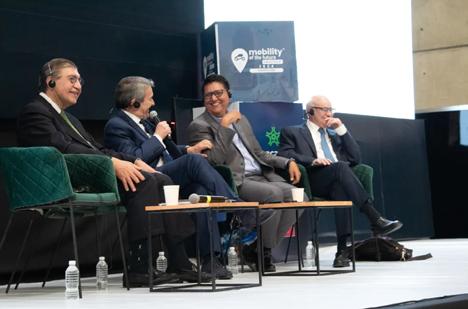GENERAL SITUATION IN MEXICO

Weekly Review I October 16, 2024



Weekly Review I October 16, 2024


Zeekr has partnered with VEMO to provide access to VEMO’s public charging network, VCN, which includes 550 stations across 14 Mexican states. This collaboration aims to improve charging availability, a key factor in EV adoption. Through VEMO’s “Watts by VEMO” app, Zeekr users can locate stations, pay for charging, and manage accounts. Zeekr sees the partnership as crucial for expanding its presence in Mexico, addressing charging infrastructure challenges. VEMO, committed to expanding clean mobility, plans to form more alliances to boost EV accessibility and adoption.
SOURCE: MEXICO BUSINESS NEWS
SEV, a Mexican electromobility company, is developing its own network of charging stations to support electric vehicle (EV) users and promote EV adoption. By the end of 2024, SEV plans to establish 20 charging centers, with expansion along key routes like Mexico City to Acapulco and Veracruz. The charging stations, available in major cities, currently offer 30 kW direct current chargers, with plans to increase capacity at some locations. SEV aims to meet the needs of all EV brands using GBT connectors, charging MXN 9 per kWh. In the future, SEV intends to integrate solar panels at its centers to transition to renewable energy.
SOURCE: MEXICO BUSINESS NEWS


Stellantis has announced major leadership changes aimed at streamlining its organization and improving global performance, including the retirement of CEO Carlos Tavares in early 2026. A special committee, led by John Elkann, is in place to find Tavares’ successor by late 2025. Key appointments include Antonio Filosa as North America COO and Jeep CEO, Jean-Philippe Imparato as Europe COO, and Doug Ostermann as CFO. Additionally, Gregoire Olivier will lead operations in China, and Santo Ficili will manage Maserati and Alfa Romeo. The company is also integrating its supply chain with the manufacturing division under Arnaud Deboeuf. Tavares emphasized the need for Stellantis to adapt quickly to remain competitive.
SOURCE: MEXICO INDUSTRY
At the First Global Business Summit Mexico, aerospace industry leaders, including Giovanni Angelucci (HORIZONTEC), Rodrigo Fernández (OAXACA AEROSPACE), and Carlos Lozano (FRISA), emphasized Mexico’s potential to become a key player in global aerospace manufacturing. They discussed the need to develop specialized talent, drive technological innovation, and implement public policies to support the industry. Mexico’s strategic location and the trend of nearshoring offer unique opportunities. The panel also highlighted the importance of aligning with global value chains and preparing for future trends like sustainable fuels. Collaboration between industry, government, and academia was deemed essential for sustained growth and competitiveness.
SOURCE: MEXICO INDUSTRY



An educational alliance is formed to professionalize industry personnel. As part of its strategic partnerships program, the Otay Mesa Industrial Association (AIMO) signed a collaboration agreement with the Universidad de las Californias Internacional (UDCI) to provide more growth opportunities for company employees.
AIMO’s president, José Luis Contreras Valenzuela, emphasized the association’s commitment to helping members develop both professionally and personally.
UDCI’s rector, Antonio Carrillo Vilches, highlighted the importance of partnering with businesses to support professional development. The partnership will offer AIMO members educational activities, starting with a conference on NOM 035, which addresses psychosocial risk factors in companies. The collaboration will also provide opportunities for UDCI students to complete internships and social service, benefiting both parties.
SOURCE: INDUSTRIAL NEWS BC




Construction of the Volvo plant in Ciénega de Flores has begun. The Swedish ambassador to Mexico, Gunnar Alden, commented that in addition to the historic relationship between his country and Mexico in the automotive sector, they are exploring new areas for investment, such as life sciences, energy, digitalization, and mining, with a focus on strengthening collaboration with the state of Nuevo León.
SOURCE: EL ECONOMISTA
The “Industrial Transformation Seminar: Sweden and Mexico Towards Innovation and Sustainability” focused on exploring business opportunities in the automotive sector, gathering representatives from Swedish component companies, established businesses, and government officials. Manuel Montoya Ortega of the Nuevo León Automotive Cluster (CLAUT) emphasized the region’s skilled workforce and the importance of English proficiency. CLAUT, in collaboration with Tec de Monterrey, offers a diploma in Embedded Software to enhance training. Montoya also mentioned Nuevo León’s energy surplus and the new president’s push for renewable energy. Marco Panzeri from Zapi Group highlighted the need for global companies to form local partnerships, while Héctor Pérez from Hyundai WIA stressed the urgency of improving supply chain collaboration to remain competitive, particularly in the context of nearshoring and electric vehicles.
SOURCE: EL ECONOMISTA


Index Juárez held the “Economic Outlook” conference in collaboration with Intercam Banco at the INDEX Cd. Juárez Auditorium, bringing together business professionals to discuss current economic trends and their future implications. Alejandro Fajardo, Deputy Director of Economic Analysis at Intercam Banco, provided a detailed analysis of global and national economic challenges, including inflation, monetary policies, and international trade dynamics. Attendees gained valuable insights to help make strategic business decisions. The event highlighted the importance of knowledge sharing to boost regional economic development, reinforcing Index Juárez’s commitment to fostering growth and competitiveness for local businesses.
SOURCE: MEXICO INDUSTRY




The Industrial Transformation Mexico (ITM) 2024, the premier Industry 4.0 fair in Mexico and Latin America, was held last week in León, Guanajuato. Organized with Hannover Messe and the Guanajuato government, it featured 275 companies from over 30 countries and attracted more than 20,000 visitors, including industry professionals and STEM students. The event included over 50 conferences on topics like artificial intelligence and robotics, alongside exhibitions showcasing the latest industrial innovations. Notable initiatives included the “FIRST Global Summit Mexico” and the ITMujeres program, which engaged over 5,000 young women. Governor Libia Dennise García Muñoz Ledo highlighted the event’s role in fostering local economic growth and attracting foreign investment while promoting inclusive innovation.
SOURCE: EL ECONOMISTA

The National Metrology Center (CENAM) and QSM Semiconductores announced a collaboration agreement aimed at strengthening the semiconductor manufacturing value chain in Mexico to meet national and international market demands. QSM is positioned as the only Mexican company focused on comprehensive semiconductor development, from design to manufacturing. With a $13 million investment, they plan to start chip production labeled “Made in Mexico” in 2025. This partnership emphasizes metrology, crucial for ensuring semiconductor quality, and aims to enhance specialized talent development, laboratory infrastructure, and joint research projects. By ensuring high standards in semiconductor production, QSM and CENAM seek to establish a robust ecosystem that promotes innovation, strengthens the supply chain, and positions Mexico strategically in the global technology industry.
SOURCE: MEXICO INDUSTRY



Coparmex Mexico City reaffirmed its commitment to collaborate with Mayor Clara Brugada’s administration to drive the city’s economic development. Key areas of focus include simplifying business processes, promoting formal economic activity, and attracting strategic investments in infrastructure and mobility. Coparmex also aims to address water management challenges, improve public safety, and capitalize on the city’s tourism and cultural potential. Coparmex president Adal Ortiz Ávalos emphasized the importance of continuous dialogue between the government and private sector to tackle the city’s most pressing challenges, ensuring sustainable growth and benefits for all residents.
SOURCE: EL UNIVERSAL
Mexico City faces a critical challenge in water management and supply. According to Arturo Jiménez, Director of Planning, Systems, and Control S.A. de C.V., an investment of 250 billion pesos will be required over the next 25 years to address infrastructure issues. Currently, 40% of potable water is lost due to leaks, and rehabilitating the water and sewage networks will cost around 40 billion pesos. Additional investments are needed in areas such as expanding water coverage, wastewater treatment, and flood control.
Experts suggest that international organizations and private funds should play a key role in providing affordable loans to address the water crisis. In 2024, the National Water Commission (Conagua) has a budget of 62.67 billion pesos, but this only covers a fraction of what is necessary.
SOURCE: EL ECONOMISTA



In 2024, Mexico’s metropolitan region, which includes Hidalgo, Mexico City, and the State of Mexico, has seen significant growth in automotive and industrial investments. Elisa Crespo, Executive President of the Metropolitan Automotive Cluster, highlighted that the region has experienced a productive year, meeting annual production goals and continuing to attract investments. Speaking at the CIIAM 2024 event, organized by the National Auto Parts Industry (INA), Crespo emphasized the region’s appeal due to its strong infrastructure and skilled workforce.
One key advantage of the area is its ability to balance industrial production with sustainability. Crespo pointed out that natural resources and local government support are crucial in attracting new investments. Environmental care remains a priority, and efforts are being made to ensure the automotive industry grows sustainably.
Crespo also noted Hidalgo’s pivotal role in federal mobility and automotive projects, further integrating Mexico into the global automotive industry. These investments in Hidalgo are expected to enhance the region’s position within the automotive value chain, confirming its importance to the national and global markets.
SOURCE: MEXICO INDUSTRY

AVERY DENISSON
Avery Dennison, specialized in the manufacturing of smart labels, inaugurated its new plant in Querétaro, with an investment of 181 million dollars and the projected creation of 938 jobs.
Walmart held the groundbreaking of its new distribution center, which will be located in Silao, Guanajuato, with an investment of approximately 548 million dollars. The project is expected to create 918 jobs and begin operations in Q2 of 2027.
SOURCE: MEXICO INDUSTRY, EL ECONOMISTA
• SECOND RESOLUTION OF AMENDMENTS TO THE GENERAL RULES OF FOREIGN TRADE FOR 2024 AND ANNEXES 1, 2, 5, AND 24
Purpose: To announce amendments to the General Rules of Foreign Trade regarding customs accounts, Tax ID (RFC), duty-free vehicle importation, courier and parcel companies, company certification, among others.
Status: 2024-10-15 - Published in the Official Gazette


• ANNEX 1-A OF THE SECOND RESOLUTION OF AMENDMENTS TO THE MISCELLANEOUS FISCAL RESOLUTION FOR 2024, PUBLISHED ON OCTOBER 11, 2024
Purpose: To announce amendments to the Miscellaneous Fiscal Resolution for 2024 regarding procedures to be carried out with the Tax Administration Service.
Status: 2024-10-15 - Published in the Official Gazette
LABOR
WOMEN’S RIGHTS:
• Reforms to the Federal Labor Law and the Federal Law of Workers in the Service of the State proposed to eradicate the gender wage gap.
• Submitted by President Claudia Sheinbaum, these reforms are pending discussion and approval in the Senate.
GENDER EQUALITY IN COMPENSATION:
• Constitutional reforms introduced to guarantee equal pay for equal work, regardless of gender.
• Awaiting Senate approval, these reforms were also presented by President Sheinbaum.
MINIMUM WAGE REFORM:
• Constitutional reform approved by the Senate ensures that annual minimum wage adjustments will not fall below inflation.
• The proposal now moves to Local States’ Congress for approval before being sent to the Executive.
LEY SILLA:
• A reform requiring employers to provide adequate seating for workers during shifts was approved by the Chamber of Deputies and sent to the Senate.
• This initiative will likely replace the previous “Ley Silla” proposal from December 2023.
REDUCTION OF WORKWEEK:
• A Constitutional reform proposing a five-day workweek with two days of rest, with full pay, was presented to the Chamber of Deputies.

• A Constitutional reform was introduced to calculate pensions based on the minimum wage, with sufficient budget allocation from the Ministry of Finance and the Chamber of Deputies.
• A program will retroactively pay affected workers within five years.
• An amendment to the Federal Labor Law was proposed to establish December 12 as a mandatory rest day.
• Provisions were introduced to require employers to provide a suitable dining space for workers to eat meals during designated hours.
Mexico has solidified its position as a top destination for foreign manufacturers, particularly in the consumer goods sector. Key advantages include its proximity to North American markets, competitive labor costs, and access to trade agreements like USMCA. Mexico’s skilled labor force, coupled with its established manufacturing infrastructure, supports a diverse range of industries, including automotive, electronics, and consumer goods.
In addition to serving international markets, Mexico’s expanding middle class and booming e-commerce sector offer substantial opportunities for consumer goods companies. The country has experienced rapid e-commerce growth, driven by increasing internet penetration and digital-savvy consumers, providing both foreign and domestic companies with new avenues for growth.
Multinational corporations such as Unilever, Colgate-Palmolive, and Whirlpool have leveraged Mexico’s strategic advantages to establish manufacturing operations, producing everything from beauty products to home appliances. The dual benefit of manufacturing in Mexico lies in serving both global and growing domestic markets, making it an ideal hub for consumer goods companies looking to maximize efficiency and market reach.

Launching a manufacturing operation in Mexico offers numerous benefits, such as proximity to the U.S. market and competitive costs. However, navigating regulatory requirements, infrastructure setup, and hiring can be daunting. Shelter services in Mexico provide an effective solution for foreign companies by offering a streamlined way to establish operations without needing to create a legal entity.
Shelter providers handle regulatory compliance, facility setup, workforce recruitment, and administrative tasks, allowing companies to focus on production and product development. This partnership reduces overhead, mitigates risk, and accelerates the time-to-market. By leveraging shelter services, companies can swiftly and efficiently enter Mexico’s thriving manufacturing sector and capture new market opportunities.
Multinational companies across industries like automotive and aerospace have successfully utilized shelter services, significantly reducing setup time and scaling their operations faster.